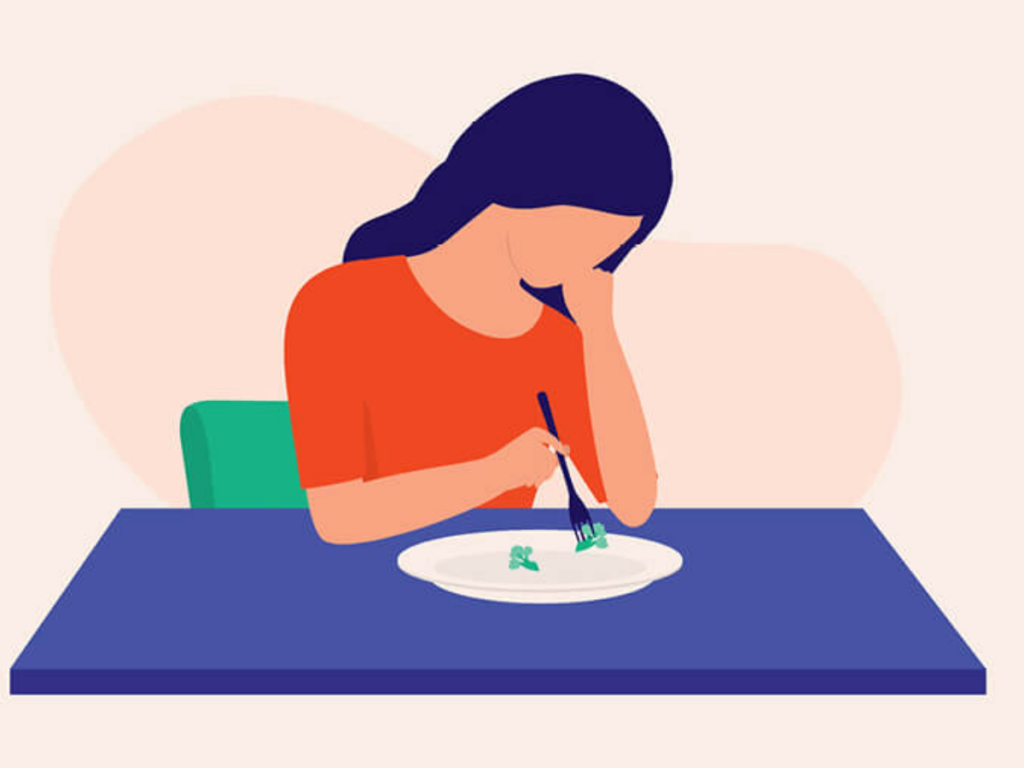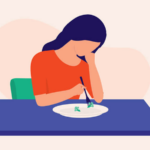
Eating disorders are serious mental health conditions that affect a person’s relationship with food, body image, and overall well-being. They go beyond diet and weight concerns and often stem from deep-rooted emotional, psychological, and social issues. Millions of people worldwide struggle with eating disorders, and understanding the different types can help in early identification and effective treatment. In this blog, we’ll explore the most common eating disorders, their symptoms, and how they impact a person’s life.
1. Anorexia Nervosa
Anorexia nervosa is one of the most well-known eating disorders, characterized by extreme food restriction, fear of weight gain, and a distorted body image. People with anorexia may see themselves as overweight even if they are dangerously underweight. Symptoms of anorexia include:
- Drastic weight loss
- Intense fear of gaining weight
- Obsession with calorie counting and food restriction
- Excessive exercising
- Weakness, dizziness, and fatigue
- Brittle hair and nails
Anorexia can lead to severe health complications, including heart problems, bone loss, and even organ failure if left untreated.
2. Bulimia Nervosa
Bulimia nervosa is marked by cycles of binge eating followed by purging behaviors such as self-induced vomiting, excessive exercise, or the misuse of laxatives. Unlike anorexia, people with bulimia often maintain a normal weight, making it harder to detect. Symptoms of bulimia include:
- Episodes of uncontrollable eating followed by guilt and purging
- Fear of gaining weight despite a normal body size
- Damaged teeth and gums from frequent vomiting
- Sore throat and digestive problems
- Feeling out of control during binge episodes
Bulimia can have severe consequences, including electrolyte imbalances, dehydration, and gastrointestinal issues.
3. Binge Eating Disorder (BED)
Binge eating disorder (BED) is the most common eating disorder and involves frequent episodes of eating large amounts of food, often in a short period, without purging behaviors. Unlike bulimia, BED is not followed by compensatory actions, leading to weight gain and associated health risks. Symptoms include:
- Eating beyond the point of fullness
- Feeling guilty or ashamed after binge episodes
- Eating when not hungry
- Rapid eating
- Weight fluctuations or obesity-related health issues
BED can lead to physical and emotional distress, including diabetes, heart disease, and depression.
4. Avoidant/Restrictive Food Intake Disorder (ARFID)
ARFID is characterized by an extreme avoidance of certain foods or overall low intake of food, leading to nutritional deficiencies. Unlike anorexia, ARFID is not driven by a fear of weight gain but rather sensory sensitivities, lack of interest in food, or past traumatic experiences with eating. Symptoms include:
- Avoidance of certain food textures, colors, or smells
- Severe picky eating that results in weight loss or malnutrition
- Lack of appetite or interest in food
- Dependence on nutritional supplements
ARFID can cause serious developmental and nutritional problems, especially in children.
5. Orthorexia
Although not officially recognized in diagnostic manuals, orthorexia is an unhealthy obsession with eating only “clean” or “healthy” foods. It differs from a normal focus on healthy eating because it becomes obsessive and negatively impacts daily life. Symptoms include:
- Avoiding entire food groups due to fear of being unhealthy
- Extreme anxiety over food preparation and ingredients
- Social isolation due to dietary restrictions
- Malnutrition and weight loss due to an overly restrictive diet
Orthorexia can lead to significant physical health issues and emotional distress.
6. Pica
Pica is an eating disorder that involves craving and consuming non-food substances, such as dirt, chalk, hair, or soap. It is more common in children, pregnant women, and individuals with developmental disorders. Symptoms include:
- Persistent craving for non-food items
- Potential poisoning or digestive issues due to ingestion of unsafe substances
- Nutritional deficiencies, particularly iron and zinc
Pica can result in severe medical complications, including intestinal blockages and poisoning.
7. Rumination Disorder
Rumination disorder is characterized by the repeated regurgitation of food, which may be re-chewed, re-swallowed, or spit out. This behavior is not due to a medical condition and can lead to malnutrition and social isolation. Symptoms include:
- Frequent regurgitation of undigested food
- Weight loss and nutritional deficiencies
- Avoidance of eating in public due to embarrassment
Understanding the Impact of Eating Disorders
Eating disorders not only affect physical health but also take a toll on mental well-being. They can lead to anxiety, depression, and social withdrawal. Many people struggling with eating disorders experience feelings of guilt, shame, and low self-esteem, making it crucial to seek professional help.
Treatment and Recovery
Early intervention is key to recovering from an eating disorder. Treatment options include:
- Therapy (Cognitive Behavioral Therapy, Dialectical Behavior Therapy)
- Nutritional counseling to restore healthy eating habits
- Medical monitoring to address physical complications
- Support groups for emotional support and motivation
Summary
Eating disorders are serious conditions that require attention, understanding, and treatment. Recognizing the signs early and seeking help from a qualified professional can make a significant difference in recovery.
For those struggling with eating disorders or other mental health concerns, expert guidance is essential. Dr. Neha Gupta, a leading psychiatrist in Pune and PCMC, specializes in treating eating disorders and mental health conditions. Her compassionate and evidence-based approach helps patients regain control of their lives and develop a healthier relationship with food and their bodies.
If you or someone you know needs help, consult Dr. Neha Gupta, the best psychiatrist in Pune and PCMC, for expert care and support.



